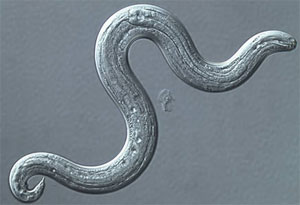A California couple is unsure how they contracted rat lungworm disease on their honeymoon in Hawaii.

Newlyweds Ben Manilla, 64, and Eliza Lape, 57, tied the knot in Maui in January, KGMB reports. After spending two weeks in the Hana area on the island, Lape told the site she began feeling symptoms of the disease before going home to San Francisco.
“My symptoms started growing to feeling like somebody was taking a hot knife and just stabbing me in different parts of my body,” she said.
Her husband, who teaches at the University of California at Berkeley’s Graduate School of Journalism, told the Honolulu-based news site he had several operations.
What is rat lungworm disease?
The Hawaii State Department of Health has confirmed nine cases of rat lungworm disease in total since the beginning of the year, CNN reports, including six in Maui. There have been no reported deaths.
READ MORE: Cyclospora outbreak: Canadian health officials warn of parasite causing illnesses
The parasite, known as Angiostrongylus cantonensis, affects the brain and spinal cord, the department of health notes. The adult form of the parasite can be found in rats (hence the name), but rodents can pass larvae of the worm in their feces.

“Snails, slugs, and certain other animals (including freshwater shrimp, land crabs, and frogs can become infected by ingesting this larvae; these are considered intermediate hosts,” the department notes.
Symptoms could include severe headache, low-grade fever, vomiting and sometimes, a temporary paralysis of the face.
People infected can also develop a rare form of meningitis.
However, the department notes some people may not have any symptoms or only experience mild ones.
Humans can be infected with the worm if they eat raw or under-cooked infected hosts. The Center for Disease Control and Prevention (CDC) adds humans can also get infected by eating raw produce that contain small snail or slug parts.
“In humans, juvenile worms migrate to the brain, or rarely in the lungs, where the worms ultimately die,” the CDC notes.

Heather Stockdale Walden, an assistant professor in the department of infectious diseases and pathology at the University of Florida, told CNN the disease has been an “endemic” in the U.S. state for at least 50 years.
READ MORE: 1 in 10 U.S. moms infected with Zika have babies with birth defects: report
“Angiostrongylus cantonensis can present differently in adults and children. So usually, in adults, one of the main things that you hear complaint of is a headache,” Walden told the site. She added that adults commonly report neck stiffness, nausea and vomiting.
Experts also say the disease is under-reported, according to KGMB.
- ‘Super lice’ are becoming more resistant to chemical shampoos. What to use instead
- Solar eclipse eye damage: More than 160 cases reported in Ontario, Quebec
- 3 women diagnosed with HIV after ‘vampire facials’ at unlicensed U.S. spa
- Canadian man dies during Texas Ironman event. His widow wants answers as to why
“They’re just reporting numbers being discharged from hospitals, so they’re missing all the other cases where people might go into a clinic and not a hospital,” Susan Jarvi, a professor of pharmaceutical sciences at the University of Hawaii at Hilo, told the news site.
What to remember when you’re travelling
“International travel can expose you to infectious diseases not frequently seen in Canada,” Rebecca Gilman of the Public Health Agency of Canada tells Global News.
“International travellers should ensure that their routine immunizations – including tetanus, diphtheria, whooping cough (pertussis), polio, measles, mumps and rubella – are up to date. Proof of yellow fever vaccination is needed to enter some countries. Be aware that some vaccinations and preventive medications can take time to become effective.”
Although there is no travel warning for Canadians going to Hawaii, Gilman says travellers should always check Canada’s Travel Advice and Advisories site before booking a trip.
She adds the Public Health Agency of Canada continues to recommend pregnant women and those planning a pregnancy to avoid travelling to areas in the U.S. with reported cases of Zika virus.

“The United States have reported cases of Zika virus infection transmitted locally by mosquitoes in the states of Florida and Texas,” she says. “Travellers should protect themselves from mosquito bites at all times, as the Zika virus is transmitted by a mosquito that can bite in daylight and evening hours.”
To read more about rat lungworm disease, the agency also has a pathogen safety data sheet.




Comments